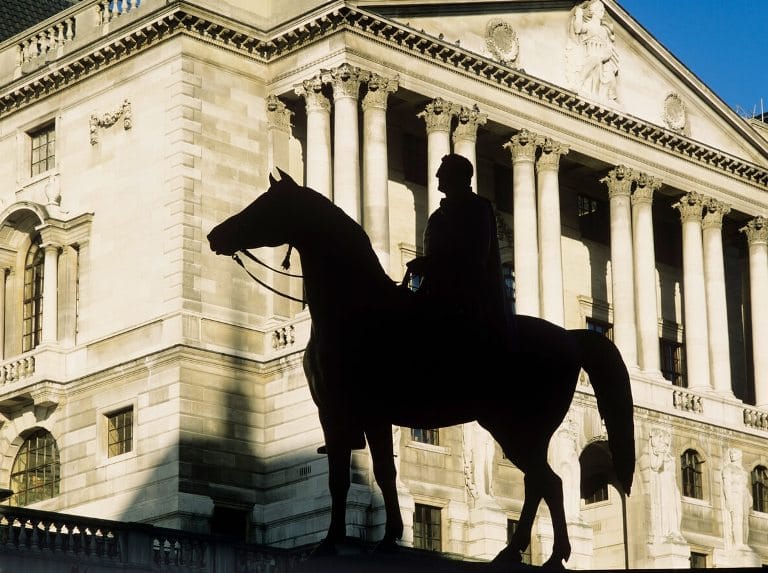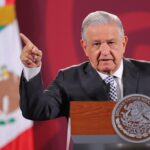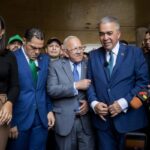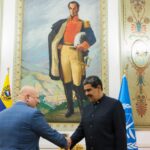
By Jesus Inojosa – Jul 3, 2020
This Thursday the High Court of Great Britain issued a ruling recognizing the illegal ad-hoc board for the Central Bank of Venezuela (BCV), appointed by deputy Juan Guaidó, violating the regulations governing the election of the board of the highest monetary entity of the country, and the Venezuelan Constitution.
This ruling, which will be appealed by the BCV authorities and the Venezuelan government, could be the consummation of an operation that started in 2018 and that seemed to end before the parliamentary elections, where Venezuelans with their vote will choose a new National Assembly (AN), as stipulated in the constitution.
Step 1: Triad Borges-Vecchio-Ledezma
The actions to block assets of Venezuela abroad were undertaken by the deputy Julio Borges in April 2018, when he, along with the fugitives Carlos Vecchio and Antonio Ledezma, made a “tour” of Europe to request “greater pressure “against the Venezuelan government and” international vigilance to prevent “the Venezuelan government” from continuing to borrow and sell the nation’s assets. ”

As a result of this tour and after the approval of an executive order by the United States government, directed to boycott the use of gold by the Venezuelan authorities, on November 9 of that same year, the Bank of England refused to deliver 14 tons of gold as requested by the BCV.
RELATED CONTENT: To Whom did the UK Ambassador in Caracas Present his Credentials? (UK Looting Gold)
This action was applauded by the triad led by Borges, who on November 30, foreseeing the possibility of the delivery of these assets to the Venezuelan government, published a letter advising the Bank of England that in agreeing to this request made by the Venezuelan authorities, they would be violating Trump’s executive order.



Step 2: Guaidó self-proclamation
On January 5 (2019), the opposition majority of the National Assembly elected Juan Guaidó as president of the directive board of parliament, who presented a “route”, in which as second point “the appointment and recognition of legitimate representatives before international bodies and organizations” was stipulated.

Likewise, he pointed out as the seventh point of his “route for the transition”, to “create the fund for the recovery of assets”, so that they could “be frozen and returned to the people when the usurpation ceases.”
Subsequently, on January 15, deputy Carlos Paparoni presented a draft agreement to the AN in contempt, where 46 countries were asked to “protect the assets of the Venezuelan State, in the face of the flagrant usurpation of the executive power by citizen Nicolás Maduro Moros,” which was approved, although it lacked legality.


Given the legal and constitutional impossibility these actions were undertaken by the parliament signified, on January 23 Juan Guaidó proclaimed himself “interim president”, as the first step in building a parallel “government” that would open up the possibility of building a legal cover, to facilitate the operation of kidnapping assets.
RELATED CONTENT: US Seeks to Seize Iranian Gasoline en Route to Venezuela
“We are not going to continue allowing the money from all of Venezuela to be stolen (…) In the next few hours we will make official announcements to achieve the protection of those assets,” were the first statements offered by the person who claimed himself “president.”
Step 3: Legal cover
By January 28, Guaidó publishes the “progress” in the framework of the agreement approved before his self-proclamation, where he announces that he will initiate “concrete” actions to comply with this document.

After this announcement, the news emerged in international media about a letter signed by Guaidó, in which he asked the then Prime Minister of Great Britain, Theresa May, to prevent a possible repatriation of Venezuelan gold, requested by the BCV.
“I am writing to ask you to end this illegitimate transaction,” Guaido said in the letter sent to the British president and Mark Carney, governor of the Bank of England.

Subsequently, on February 5, 2019, the NA in contempt approves a “Statute for the transition”, which arrogates supra-constitutional powers that it places in the hands of the self-proclaimed, and among which is stipulated, the designation of boards of directors for public companies and Venezuelan institutions.
Step 4: Parallel directives
Under the foundation of this “statute”, which was declared “null and void” by the Constitutional Chamber of the Supreme Court of Justice (TSJ), Guaidó proceeds to appoint “ambassadors” and “ad hoc directives” in the Venezuelan companies and institutions.
Thus, on March 19, the appointment of Vanessa Newmann as “ambassador” to the United Kingdom is announced. She is a Venezuelan woman of Jewish origin residing in the United States, where she has worked as an adviser to the State Department and the US Department of Defense in the fight against “illicit finances.”
Then, on July 23, 2019, the self-proclaimed announced the appointment of the ad hoc board of directors of the Central Bank of Venezuela, which would be composed of Ricardo Villasmil, Nelson Lugo, Manuel Rodríguez and Guaicoima Cuius.

Among the eight recitals contained in the “decree” for this illegal designation, fourth mention the importance of “obtaining control” of Venezuelan reserves and gold abroad.
Step 5: Pact with the United Kingdom
Once all the bureaucratic architecture has been elaborated, with the support of the United States, a series of meetings is held, in one of which, in addition to the United Kingdom’s ambassador to Venezuela Andrew Soper, the chief for Latin America of the British Foreign Ministry James Dauris, who while leaving this meeting, held on October 16, 2019, ratified the support of the English government for Guaidó.

By January 2020, Guaidó is on a tour of Europe, which takes him to the United Kingdom, where he meets with Prime Minister Boris Johnson and Chancellor Dominic Raab.

As a result of these meetings, the creation of a “unit for the reconstruction of Venezuela” in the British Foreign Office was agreed upon, which was kept secret until it was exposed by the British newspaper “The Canary”, which published documents, where it was indicated that this action sought to establish the promotion of British businesses after the hypothetical overthrow of the constitutional president of Venezuela, Nicolás Maduro.
After this revelation, the Venezuelan ambassador to the United Nations (UN), Samuel Moncada, on his Twitter account, denounced this action by the British Foreign Ministry as part of the “looting” operation that was being carried out by the United Kingdom and Guaidó, against the Venezuelan nation.
1/2 Documentos oficiales británicos revelan la existencia una “unidad de reconstrucción de Venezuela” encargada de trabajar con los mismos criminales que firmaron el contrato colonial en EEUU para asesinar a miles de venezolanos.
¡Así se saquea una nación! pic.twitter.com/OxRi9TIhvJ
— Samuel Moncada (@SMoncada_VEN) May 13, 2020
2/2 Gobierno británico busca ventajas para sus negocios una vez que Trump imponga su régimen colonial en Venezuela. Esa es la explicación al envío de barco de guerra al Caribe y a la complicidad en las operaciones de “máxima presión” en medio de una crisis humanitaria mundial. https://t.co/Rldx9VyHsD
— Samuel Moncada (@SMoncada_VEN) May 13, 2020
Step 6: Completion of theft
Given these actions evidenced in the framework woven for the stripping of gold reserves, and in view of the constant refusal by the Bank of England to deliver this heritage to its rightful owners, on May 20, 2020, Venezuela proceeded to initiate a lawsuit against this institution, for breach of the contract signed in 2008 with the BCV.
The decision of this lawsuit, which for now favors the interests of this plot orchestrated by a sector of the Venezuelan opposition, the United States and the United Kingdom, could be the consummation of another operation of robbery against Venezuela, under the auspices of a Juan Guaidó, who boldly celebrates and boasts of this ruling, which denies Venezuelans the possibility of transferring these resources to the United Nations Development Program (UNDP), as they had agreed with this agency, to acquire equipment and medicines to combat the Covid-19 pandemic in the country.
Featured image: Bank of England. File photo.
OT/JRE/EF
- orinocotribunehttps://orinocotribune.com/author/orinocotribune/
- orinocotribunehttps://orinocotribune.com/author/orinocotribune/April 24, 2024
- orinocotribunehttps://orinocotribune.com/author/orinocotribune/
- orinocotribunehttps://orinocotribune.com/author/orinocotribune/April 23, 2024
Tags: Antonio Ledezma Bank of England (BoE) Central Bank of Venezuela (BCV) gold Juan Guaido julio borges looting UK US Imperialism Venezuela
Share this:
- Click to share on Twitter (Opens in new window)
- Click to share on Facebook (Opens in new window)
- Click to share on LinkedIn (Opens in new window)
- Click to share on WhatsApp (Opens in new window)
- Click to share on Reddit (Opens in new window)
- Click to share on Telegram (Opens in new window)
- Click to email a link to a friend (Opens in new window)





You must be logged in to post a comment.